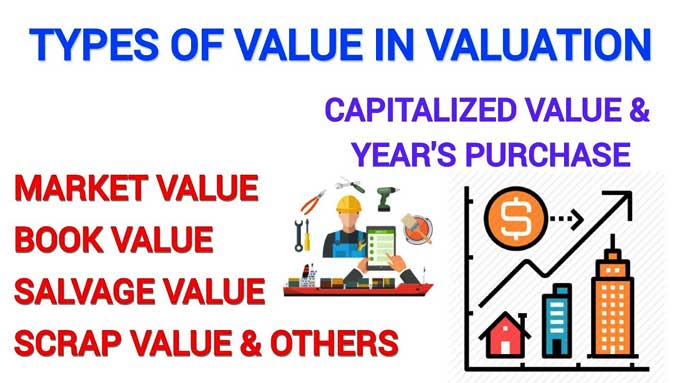
Value Types 101: A Guide for Every Construction Organization

A building, property, machinery, equipment, etc. is only worth or useful if they are worth it. Demand and supply determine the value of anything at any given time. There is a possibility that the value of the property will be more than its current value or price in a short period of time. Estimating and Costing of certain things use many different types of values.
Types of Value
Market Value
If you put the property up for sale, you will be able to get its market value at that particular time on the open market. Demand and supply may influence market value at different times. A change in the industry, a change in fashion, a change in the cost of labor and materials, a change in transportation costs, etc., also affects the Market Value.
Scrap Value
When an item considers no longer useful, its scrap value refers to the value of all of its various components. Long-term assets, such as machinery, cars, or furniture, can be disposed of after serving their purpose.
Salvage Value
As asset ages, its resale value increases. This is known as its salvage value. When calculating the amount to be depreciated on a fixed asset, it is deducted from the purchase price. Thus, salvage value is included when computing depreciation.
Potential Value
Whenever a property has the potential to fetch a higher return through alternative uses, advantageous planning, or by the provision of development works, it is said that the property has a Potential Value.
Speculation Value
Speculation Value is the price paid when a property is purchased with the intention of selling it for profit at some point in the future. Construction companies, for instance, may plan to build a new road or expand an existing road from a specific area. As a result, property speculators are more inclined to buy such properties at a discount in the future to resell at a profit. Speculation value describes the price he pays for the property.
Book Value
Depreciation is allowed after the books are adjusted to show the book value. Property Book Value is calculated by subtracting the original cost from the depreciation up to a particular year. At the end of the property's utility period, the Book Value will be only Scrap Value due to the amount of depreciation that has taken place.
Sentimental Value
Sentimental value is the term used to describe when a property is sold or purchased at a price above the market value considering the owner's sentiments. Due to the attachment to the property, the owner may seek a high price for it.
It may be ideal for a particular purchaser and have a special value for him/her if the property's circumstances and category suit him/her. In the event that two prospective buyers outbid each other on an identical property, then the property's value will certainly rise above its existing value.
Ratable Value
After subtracting yearly repairs from gross income, the ratable value of a property is its net annual letting value. Ratable values of real estate are used to determine the amount of municipal and other taxes.
Distress Value
Distress value refers to a property's price if it is sold at a lower price than the open market would allow. The vendor is experiencing a financial crisis, which results in him/her selling their property or shop at a very low price, or they are panicking due to riots, earthquakes, disputes between partners, or sentimental reasons.
Accommodation Value
There are a limited number of purchasers of such properties, and the length and depth of small strips of land prevent independent development. Landowners of adjoining strips may only be willing to sell these strips at low prices if they offer them only at a low price. The Accommodation Value refers to this.
To learn more, watch the following video tutorial.
Video Source: Mukesh Kumar
Wrapping it Up
Except for scrap sales at the end of the useful life of a property, decommissioned materials have zero value. A building that has been expired its useful life can be salvaged for parts such as bricks, steel, timber products, etc.
An allowance of 10 percent for scrap is included in the construction process.
Trash value or demolition value are also commonly used terms. A demolition or disassembly cost that is equal to or exceeds the scrap value will lead to a zero demolition or disassembly cost.

Image Courtesy: goseeko.com

